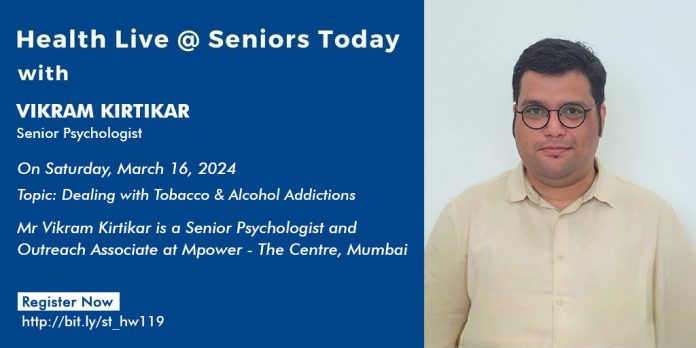On 16 March 2024, Seniors Today hosted their weekly Health Live Webinar with Mr Vikram Kirtikar, a Senior Clinical Psychologist who spoke on and answered questions about Dealing with Tobacco and Alcohol Addictions.
Mr Vikram Kirtikar is a Senior Psychologist and Outreach Associate at Mpower – The Centre, Mumbai. He has been with Mpower for around six years and has rich experience in the field of psychology which includes working with diverse populations ranging from geriatric to adolescents. He has experience in academic setups and professional practice as a psychologist.
Working with the elderly and understanding their unique needs has intrested Vikram and providing that space to nurture that interest has always been his endeavour.
His area of expertise includes Cognitive Behavioural Therapy, Rational Emotive Cognitive Behavioural Therapy and Behavioural Therapy. He is well-versed with Online Psychotherapy. He has received formal training and certification in a Promotive Intervention module for the youth in Positive Psychology from NIMHANS. He has also undergone formal training and certification in RECBT basic & advance from InVivo institute of RECBT.He has experience in conducting workshops on various topics in various setups. Mr Kirtikar believes that the ease of access to mental health care is everyone’s right and strives in providing it.
Addiction has both a medical, biological aspect and how we experience our life. These are both contributory factors to substance use and abuse.
Substance is anything that when consumed can alter the chemicals in your brain which can lead to intoxication due to the said substance.
There are many forms of substance use and the severity also varies.
- Substance use- alcohol consumption socially.
- Harmful use- consuming the substance more frequently
- Dependence- the individual feels the need to consume the substance. Absence of which can cause withdrawal such as tremors in the hand, excessive anxiety, palpitations, etc.
When the frequency of consumption of a substance increases, your brain observes that the pattern is being repeated and that maybe it is routine to feel this way and this is what the individual wants more of.
Types of substance:
- Tobacco: this can be in the form of beedhi, gutka, cigarettes, cigars, etc. this can be consumed through c eating, chewing
- Alcohol
- Cannabis: in the form of joint, bhang
- Prescription medication such as pain medications
With alcohol antisocial behaviour, liver diseases and death are also observed.
As we age, the time it takes to metabolise the substance that we consume and that our body could metabolise quickly when we were younger. It hence starts to affect our health as the years progress.
Causes for substance abuse in the elderly:
- Mental disturbance
- Losing a close/ loved one- substance abuse can be used as a coping mechanism
- To overcome the feeling of loneliness
- Coming to terms with one’s own mortality
- Increased symptoms of pre-existing mental health symptoms
- Coping with new diagnosis
Treatment modalities;
- Medication: a psychiatrist will be able help and guide you better
- Counselling and therapy
Both medication and counselling compliment each other.
Building an environment that is understanding rather than reprimanding is very important.
Engagement and activity help in deterring someone from consuming the substance.








